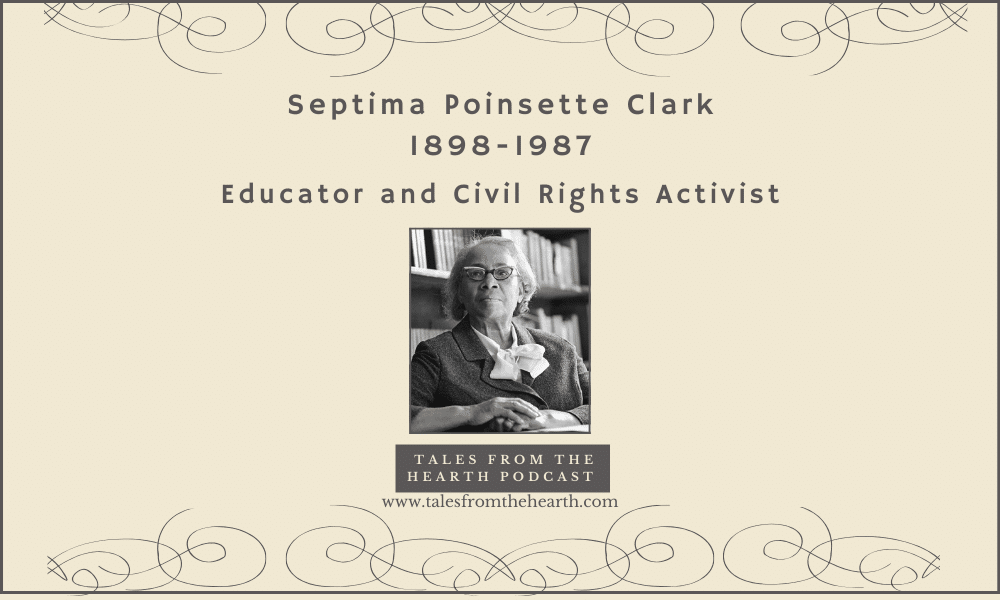Septima Poinsette Clark
May 13, 1898 – November 17, 1987
Episode Intro: Did you hear about the woman known as the “Grandmother of the Civil Rights Movement”? How about one of the few people Dr. Martin Luther King, Jr. invited to Norway for the acceptance of his Nobel Peace Prize in 1964? Join us for today’s episode on the incredible strength of educator and civil rights activist, South Carolinian Septima Poinsette Clark.
Let’s get cracklin’, shall we?
**********
When I read about the life and deeds of Septima Poinsette Clark, I was taken with the level of influence and reach that she contributed to the civil rights movement. She worked around the clock as an underpaid educator in underserved African American communities, teaching children and adults alike how to read and write. Through her *897* “citizenship” schools, she taught people how to obtain voter registration cards, vote, and engage in nonviolent protests. These people, in turn, taught many others in their communities. She recruited and trained leaders such as Rosa Parks and Esau Jenkins. I think she may be one of the most under-recognized leaders of the civil rights movement.
Sources for today’s story are: Many! As always, refer to the episode show notes at www.talesfromthehearth.com for links to all of the resources for today’s episode.
A primary resource for this episode is a book entitled More than Petticoats: Remarkable South Carolina Women by Lee Davis Perry.
You can view many photos and links to information about Septima Poinsette Clark on our Pinterest board located at https://www.pinterest.com/TalesfromtheHearth/septima-poinsette-clark/.
The One Takeaway I hope you get from this story is: Stand up for what you believe in, and good things will happen.
Now, I hope you enjoy the story about Septima Poinsette Clark.
**********
Septima Poinsette Clark was born on May 3, 1898, in Charleston, South Carolina, the second child of eight for Victoria Warren Anderson and Peter Porcher Poinsette. Her mother was raised in Haiti and educated in Europe as the child of a Haitian woman and Native American father. Her father, Peter Poinsette, was a former slave of Joel Poinsett, who is featured in Episode 1 of this podcast for introducing the poinsettia plant from Mexico to the United States during his time as the U.S. Ambassador to Mexico.
Septima was raised in a strict and proud home where her parents valued ladylike behavior and education above all things. During this time, however, African Americans were not permitted to teach in schools, so Septima experienced teaching methods and styles that were only delivered by whites. She was remarkably bright and attended the Avery Normal School in Charleston. Upon her graduation, Septima decided she wanted to teach regardless of the law, so in 1916 she secured a teaching position on Johns Island, South Carolina, serving the African American community.
Teaching was very difficult, and the conditions on Johns Island were rudimentary at best. Students only attended school when it rained because they worked on family farms. There were no desks, paper, or an adequate heating system in the small classroom, but Septima’s students loved to learn and started to teach their parents and families at home. Before long, Septima’s teaching skills were in demand by many in the local community, and she began teaching parents and adults at night. The local residents were of the Gullah-Geechee culture; they spoke a special Creole language of English and African origins and used oral stories and traditions in their daily lives. Septima tapped into these local oral traditions to teach basic reading and writing skills to many people on the island.
In 1919 Septima joined the National Association for the Advancement of Colored People (NAACP) to advocate for black teachers to be allowed to teach in schools, achieving success when this law was finally passed in 1920. During this time Septima fell in love and married navy serviceman Nerie Clark. Their first child, a daughter, died shortly after birth while Nerie was away at sea. Their son, Nerie Jr., was born after the couple had moved to Dayton, Ohio, upon Nerie’s release from the navy. The marriage fell apart soon after, and Septima found herself raising Nerie Jr. alone.
Septima returned to Johns Island to teach in 1926, but found it hard to balance her work with raising a young child. After a rough bout of childhood illness, Nerie Jr. was sent to Nerie Clark’s family in North Carolina to be raised for many years.
Septima relocated to Columbia, South Carolina, where she taught and attended college at the same time, obtaining her college degree from Benedict College in 1942. She continued to work with the NAACP and took up a new cause: equal pay for equally qualified teachers—regardless of their race. When this law was passed in 1945, it relied upon the use of a national exam to establish equal qualifications. Septima obtained her master’s degree from the Hampton Institute in Virginia and aced the national teacher’s exam, finally achieving in 1946—after 30 years of teaching!— a salary she could live on for her skills as an educator.
Septima relocated back to Charleston, South Carolina, to care for her ailing mother. During this time, she took up many causes, such as fundraising for African American health and scholarships. She became the chairperson of the local YMCA, where she learned to negotiate with others in spite of their refusal to accept her race or gender.
In 1953 Septima began working with the Highlander Folk School in Monteagle, Tennessee, with civil rights activist-educators Myles and Zilphia Horton. The school taught its students how to successfully advocate for civil rights in their communities—including the desegregation of schools. Septima recruited and trained well-known leaders in the civil rights movement such as Esau Jenkins and Rosa Parks—you’ve heard of her, right?
In 1954 Brown vs. Board of Education desegregated schools across the nation, but many states, including South Carolina, fought this with additional laws. One law did not allow teachers who were members of the NAACP to practice. Septima was fired without a retirement or health plan, regardless of her four plus decades of service.
Septima was fortunate in that she was able to obtain a paid position at the Highlander School with the Hortons, but many were not so fortunate. Others chose to hide their affiliation with the NAACP to preserve their jobs.
At the Highlander School, Septima taught African American adults how to register to vote. While this is an easy online process now, at that time African Americans had to pass random and subjective questions in order to obtain a voter registration card and vote. Clark’s “citizenship schools” were immensely popular and quickly spread across the nation—897 in total!
Unfortunately, the Highlander School was targeted for its efforts and lost its license due to trumped-up charges. Septima and the school’s leaders aligned with the Southern Christian Leadership Conference (SCLC) led by Dr. Martin Luther King, Jr., which led to her becoming the Director of Education in 1961. She taught leaders from across the nation how to read, write, register to vote, engage in peaceful protests, and plan effective demonstration tactics. In turn, leaders whom Septima taught returned to their local communities and taught countless others. Septima traveled all over the American South recruiting and training leaders for the civil rights movement.
As such, she and her associates were often jailed and targeted for violence, and in one instance she left a meeting location that was engulfed in an arsonist’s flames only five minutes later. She disapproved of violent tactics, and was known to talk down and reason with any members who suggested violence as a solution.
Septima became known as the “Mother Conscience” and the “Mother” or “Grandmother” of the civil rights movement. She was selected as one of the few people invited to Norway by Dr. Martin Luther King, Jr. to receive his Nobel Peace Prize in 1964. She was devastated by the loss of Dr. King in 1968, and retired from the SCLC in 1970. Never fear, though—she remained active for years in Charleston, SC, raising money for African Americans, setting up childcare centers, joining the National Organization for Women (NOW) and advocating for equal gender rights, and serving on the same school board that had fired her years before (they reinstated her pension and others’ in 1976).
Septima was honored many times in her lifetime, receiving the SCLC’s Dr. Martin Luther King, Jr. Award for services to humanity, the National Education Association’s Race Relations Award, the Wil Lou Gray Award for her service to the under-educated in South Carolina, and the Order of the Palmetto, South Carolina’s highest award for outstanding service. In 1978, the city of Charleston, South Carolina, named a major highway the “Septima P. Clark Expressway” in her honor. In 1979 Clark traveled to the White House, where President Jimmy Carter awarded her the Living Legacy Award.
At the age of 89, Septima Poinsette Clark passed away on her beloved Johns Island, South Carolina.
That’s it for today! I hope you enjoyed today’s story about the remarkable feats Septima Poinsette Clark accomplished. Her legacy lives on in the many people she educated, recruited, trained, and inspired throughout her seven decades of service to others.


